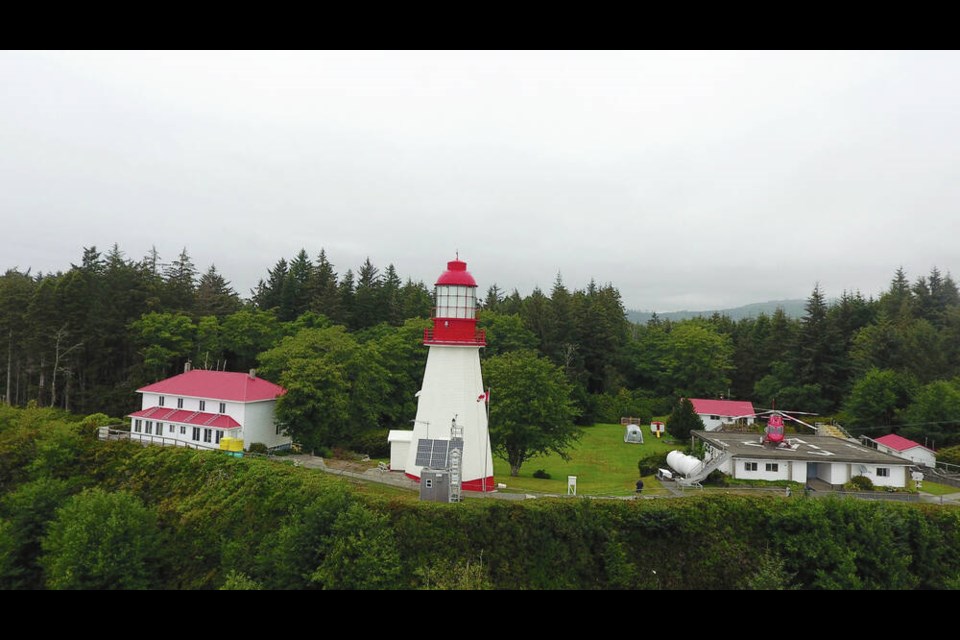An early-morning outage of the main radio channel for ships off B.C.’s south coast during heavy fog on Wednesday shows why the coast guard should ditch plans to destaff lightstations, a former lightkeeper says.
At 12:45 a.m. on Wednesday, Marine Communications and Traffic Services in Victoria experienced a loss of electrical power, said Kiri Westnedge, Canadian Coast Guard spokesperson.
Technicians restored electrical power and services at 3:20 a.m. and MCTS in Victoria resumed normal operations, she said.
The cause of the outage is being investigated, Westnedge said.
During the channel outage, lightkeepers were asked by a coast guard official to monitor the distress radio channel in case of an emergency, said Jim Abram, a former lightkeeper who is advocating for maintaining keepers at lightstations.
The outage illustrates that equipment can fail, Abram said. “Guess they do need lightkeepers.”
The incident comes as the Canadian Coast Guard takes steps to pull lightkeepers off two west coast Island stations, Pachena Point and Carmanah Point, saying the soil under their buildings is unstable and unsafe for personnel.
The total of four staff at the two stations, located next to the West Coast Trail, are set to move out in the next few weeks before winter weather arrives. Aids to navigation will remain.
The coast guard, which announced the move in July, said in a statement this week that it will likely take several years before the long-term future of the two lightstations — including whether they will be staffed again — is decided.
“Right now, the focus is on relocating the light keepers from the light stations, as both sites pose safety risks to our personnel,” said Westnedge.
Ditidaht Chief Councillor Judi Thomas, who supports removing the lightkeepers, said recently that the First Nation and coast guard have a shared goal of restaffing the stations. The coast guard says the current keepers have already accepted other jobs.
Westnedge said the coast guard is “working in consultation with the Ditidaht, Huu-ay-aht, Toquaht and Pacheedaht First Nations and is investigating long-term options going forward.”
Once the lightkeepers are relocated, “we will work with DFO, which manages the buildings, and the Nations on the future of the sites; this is likely to take several years,” Westnedge said.
Automated lights are already in place and have worked effectively at both stations since 2003, she said.
Carmanah light is automated with a solar array. Pachena’s light is automated via a diesel generator and options to install a renewable energy system will be reviewed as a long-term solution, Westnedge said.
Short-term planning for securing and fencing of the sites is currently underway, she said.
Geotechnical and hazard risk assessments were carried out on the two stations to specifically investigate concerns about small slope failures and soil exposure, Westnedge said.
“We are continuing our review of all our aids to navigation and their effectiveness. In the meantime, other light stations will continue to operate as normal.”
The destaffing announcement came as a surprise to local governments, First Nations, hikers, mariners, MPs and the lightkeepers.
Opponents have launched a petition and are writing to federal Fisheries Minister Diane Lebouthillier asking her to keep lightkeepers in place and launch a consultation process.
Destaffing critics, including former lightkeepers, argue that lightkeepers have saved mariners’ lives over many years, along with assisting hikers.
Abram, a former long-time lightkeeper, says the likelihood of lightkeepers ever returning to the two stations is “nil.”
He said 1,000-gallon fuel tanks at the stations and the fuel lines used to refill tanks from a supply vessel are being taken out, as is other equipment. Lumber has already been delivered to stations to build moving crates.
Abram was active in the fight against a plan to destaff lightstations on the west and east coasts of Canada that was scrapped after a 2011 Senate report came out in favour of keeping them.
This season, lightkeepers at Pachena Point have helped several injured hikers, including a young man with a twisted knee who was retrieved by the park’s visitor safety staff, he said. Their boat was guided to a safe place on shore by a lightkeeper, Abram said.
As well, three people who were stranded overnight stayed in the shelter at the station, Abram said.
Lightkeepers also spotted park trespassers and illegal fishing. A broken cable car was repaired by a lightkeeper, he said.
North Vancouver’s Helen Marshall says coast guard representatives should walk the West Coast Trail “before they remove human beings that live on the trail.”
Having lightkeepers at the two stations is “the best-spent government money,” said Marshall, who fell on her back and was submerged in 2019 while crossing a rushing creek on the West Coast Trail during a downpour.
She was drenched and dreading that night because her sleeping bag was soaked. “I had a bit of a meltdown. I had tears coming down my face.”
Marshall and her two hiking friends continued to the Pachena Point station, where the lightkeeper ushered them indoors and offered fresh coffee and doughnuts.
They listened to tales of shipwrecks while Marshall’s clothing and sleeping bag were in a dryer in the home of the other lightkeeper.
The lightkeepers on the station were “amazing,” she said.
“They cannot get rid of these people.”
>>> To comment on this article, write a letter to the editor: [email protected]





